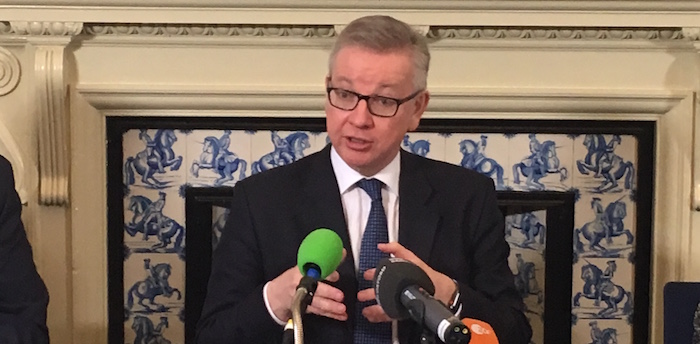Defra Secretary Michael Gove has confirmed the UK will adopt a fundamentally different support system after we leave the EU.
There will be a transitional period, probably until 2024, during the ‘fundamentally flawed’ Common Agricultural Policy (CAP) regime will be dismantled in favour of a new system that rewards public goods, mainly environmental payments.
Mr Gove used his speech at the Oxford Farming Conference to outline his vision for radical reform of UK agricultural policy. “We need to cultivate the resources, policies and people that will allow us to adapt, evolve and embrace change as an ally,” he told delegates.
“We can have our own – national – food policy, our own agriculture policy, our own environment policies, our own economic policies, shaped by our own interests,” he said, describing the current system of paying land owners for the amount of agricultural land they have as ‘unjust, inefficient and drives perverse outcomes.
“As recent scholarship has shown, the so-called greening payments in Pillar One have scarcely brought any environmental benefits at all. We can, and must, do better,” he said.
Do better
He outlined ways in which Defra could ‘do better’, including reducing bureaucracy in how it provides financial support, including the time taken to deliver farm payments and the ‘dizzyingly complex’ Countryside Stewardship rules. He also pledged to deliver a more effective risk-based inspection regime and to modernise certain processes, such as export certificates and the Department’s IT systems.
He acknowledged the Government is ‘not the champion we need to be for British food and farming’. “We can still do more to improve the procurement of British food across the public sector,” he said.
Mr Gove promised a ‘a coherent policy on food – integrating the needs of agriculture businesses, other enterprises, consumers, public health and the environment’.
“On food, first of all, I want to underline that I recognise the heart of almost all farming businesses is food production. And a core element of Defra’s mission is supporting farmers in the provision of competitively-priced, healthy, sustainable and nutritious food, and pursuing greater market access,” he said.
“But I believe it’s critical as we think of food production and the role of farming in the future that we develop policy which looks at the food-chain as a whole, from farm to fork, and we also recognise the economic, health and environmental forces shaping the future of food.”
But he made it clear, there will be a fundamental new approach to post-Brexit farm policy.
Transition period
“Given the scale, and nature, of the change which is coming I recognise that farmers need to be given the time, and the tools, to become more adaptable,” he said.
In a question and answer session, he confirmed that the current £3bn received by UK farners under the CAP will be guaranteed until 2024. He also envisages a five-year transition after the end of the current BPS scheme during which Basic Payments will be phased out.
“We will continue support for Countryside Stewardship agreements entered into before we leave the EU and will ensure that no one in an existing scheme is unfairly disadvantaged when we transition to new arrangements. We will pay the 2019 BPS scheme on the same basis as we do now,” he said.
BPS payments are likely to continue for the transition period in England. “During this time, we propose to first reduce the largest BPS payments in England. We could do this through a straight cap at a maximum level or through a sliding scale of reductions, to the largest payments first.
“After the implementation period, this transitional payment could be paid to the recipient without the need to comply with all the onerous existing cross-compliance rules and procedures.”
“Inspections would, of course, continue but in the streamlined and risk-based fashion I described earlier. Provided our own animal welfare, environmental and other laws were observed the payment would be guaranteed.
Public goods
“We will look at ways to support farmers who may choose to leave the industry. And, after that transition, we will replace BPS with a system of public money for public goods. The principal public good we will invest in is environmental enhancement.
“In thinking about how better to support farmers in the work of environmental protection and enhancement it’s critical – as everyone in this room but not everyone outside appreciates – to recognise that there is no inherent tension between productive farming and care for the natural world.”
“We plan to provide new support for those who choose to farm in the most sustainable fashion,” he said.
He added: “I believe we should also invest in technology and skills alongside infrastructure, public access and rural resilience.”
He brought conference speech to an end by emphasising importance of natural capital to his vision. “My starting point in thinking of our countryside, and of rural life overall, is that its overall worth to us goes far beyond its economic value alone,” he said.




